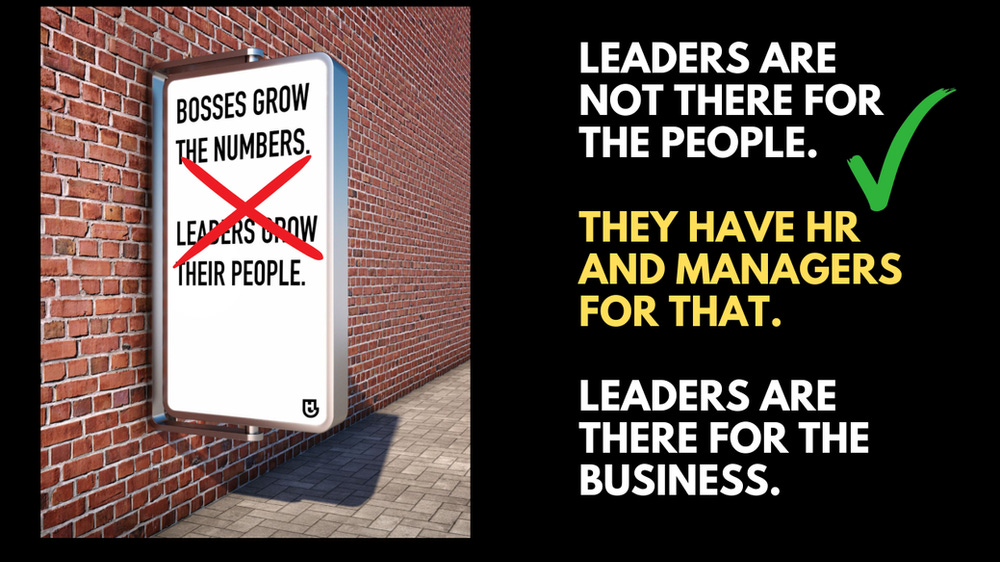HR’s job is to make sure leaders don’t have to worry about people matters
CEOs must look after the business
Whoever comes up with these quotes has never worked in a company, certainly not in a large organisation. LinkedIn is a hot mess with these quotes and posts that have no practicality or relevance.
"Every aspiring CEO should spend at least two years in HR to understand what it takes to be there for your people." No, CEOs must learn how to make money so they don't have to lay employees off. That is their way of being there for their people.
"Every CEO must apply to their company or go undercover once a year to understand their people's experiences" That's why you have HR to test employees' experiences and take action. You don't need a CEO for that.
"Leader's responsibility is to take of the people so that the people can take care of the business.” No, it is the managers’ and HR's responsibility to take care of the people so they can take care of the business.
"Bosses grow the numbers leaders grow their people." False. Leaders grow the business, that is why they are hired.
"When you become a leader success is about growing others." Once again, false.
This kind of fluff sounds great and resonates with employees on an emotional level — which is why it racks up likes — but it’s miles away from how things actually work in reality.
In reality, CEOs must look after the business nothing else. Their role is to raise stock prices, IPO companies, deal with business investors, negotiate with governments (depending on the size of the company), acquire new companies, grow the business in terms of numbers etc. CEOs are out there dealing with bankers, and shareholders and representing the company on the global stage. That’s what my ex-CEO was doing which made us extremely successful. I don’t know what examples you have seen but I think you saw the wrong ones. CEOs don’t deal with or think about the employees or the customers. This is why they have teams. They think for the business. And if that’s not what they do they are in the wrong job. Of course, it depends on the size of the company and structure but the moment you have managers on board leaders must deal with growing the business.
This applies to other business leaders too not only to CEOs. The role of the VP of marketing is to make sure money is coming through advertisements. The CFO's role is being right next to the CEO when investors and shareholders are asking about the balance sheet. The role of an F&B VP is to ensure the strategy is financially viable and so on.
Then comes the only leader who should be caught up in people matters: HR. HR is responsible for looking after both the business and the employees. CEOs and other leaders look at people-related metrics the same way they look at any other business numbers. And when those metrics — like employee engagement or turnover rates — aren’t where they should be, they turn to the HR leader and managers to ask what’s going on with their people.
But that doesn’t mean they’re truly invested in it, spend time on people matters, or — heaven forbid — start fixing anything themselves. Instead, they tell the CHRO or head of HR to "sort it out," just like they’d tell the head of PR to manage the company’s reputation. And if HR or the managers can’t fix it? It’s time to find new ones.
HR and line managers are the ones who look after the people — not leaders. Managers are the ones who train, coach, guide, and grow their teams. In fact, 70% of the employee experience depends on them. This is where HR comes into the picture. It’s their job to develop, guide, and support managers in this process so that, together, they take care of the people — allowing leaders to focus on the business.
HR’s job is to make sure leaders don’t have to worry about people matters. Because if leaders do have to step in, then what’s the point of having HR or managers in the first place?
There’s a hierarchy for a reason, and you really don’t want a leader who’s caught up in people matters. I’ve seen it — and it wasn’t pretty. There was nepotism, favoritism everywhere, and the business failed. Is that what you want?
And do you know why that leader got so involved in people matters instead of focusing on the business? Because he had no idea how to run a business. When we don’t know how to do our actual job, we often end up doing something else instead.
Do the job you were hired for. Simple.
Podcast
Focus on employee motivation not on engagement
Book
If you would like to have 365 of these articles categorised into nine areas so you can find easily what’s relevant to you:
Employee Experience / HR
Attract
Hire
Onboard
Motivate / Engage
Perform
Develop
Depart
Everyday Random Staff Related to People Management
Then click the below link and order your HR playbook that questions everything we do in organisations and offers hundreds of alternative solutions.






